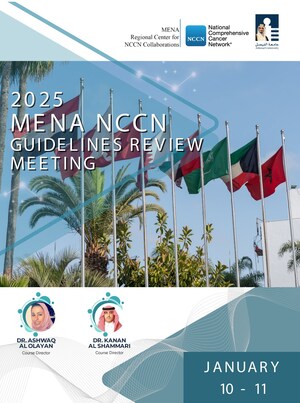PLYMOUTH MEETING, Pa., Nov. 19, 2018 /PRNewswire/ -- The National Comprehensive Cancer Network® (NCCN®) has published the first of three guidelines for patients with head and neck cancers, focused on oral cavity (mouth and lip) cancers. The guidebook offers treatment explanations based on the recommendations from the NCCN Clinical Practice Guidelines in Oncology (NCCN Guidelines®) used by clinicians, put into plain language with accompanying glossary and background. This free online resource is also available in print through Amazon.com for a nominal fee. The publication was made possible thanks to funding through the NCCN Foundation®, and sponsorship from the Head and Neck Cancer Alliance (HNCA) and Support for People with Oral and Head and Neck Cancer (SPOHNC).
"These guidelines will help to decrease the anxieties associated with a cancer diagnosis," explained Mary Ann Caputo, Executive Director, SPOHNC. "You will learn and empower yourself with the necessary knowledge of the disease and its treatment. These tools will enable one to go forward with a strong conviction of moving on and living a full life."
"When I was first diagnosed, I was surprised, overwhelmed and scared. I was completely focused on the treatment for my cancer, and so initially I was less aware of all the information shared with me during my medical appointments about my particular diagnosis," said Jason Mendelsohn, HNCA Board Member and Survivor. "These guidelines are a great resource that patients, their caregivers, and families can read when they're ready and able to focus on everything they need to know. We believe they will be a great resource for head and neck cancer patients everywhere."
Ellie Maghami, MD, FACS, Chief and Professor, Division of Otolaryngology/Head and Neck Surgery, City of Hope National Medical Center, and Member, NCCN Guidelines Panel for Head and Neck Cancers says Mendelsohn's experience is one she's seen again and again. She emphasized that while smoking and other tobacco use is by far the most common cause of mouth cancer, it can happen to anybody.
"It's not just an old person's disease or just a smoker's disease," said Dr. Maghami. "For instance, incidences of tongue cancer — which is a type of oral cancer — are on the rise in non-smoking young people." She also explained that HPV, despite its common link to throat cancer, is actually responsible for fewer than five percent of tongue cancer occurrences.
The NCCN Guidelines for Patients explain that there are several different types of cancers that can originate in all different parts of the mouth. They are generally treated first by surgery, including immediate reconstruction as needed and followed by rehabilitation of speech and swallow functions. It can be beneficial to receive treatment at a high-volume cancer center with highly-experienced specialists who frequently treat these rarer types of cancers. The NCCN Guidelines® also recommend enrollment in clinical trials whenever possible, and advocate for asking questions and seeking second opinions.
As with most cancers, early detection can make a huge difference. According to Dr. Maghami, these cancers are often caught early, thanks to the high visibility of the mouth location.
"It's relatively easy to do a self-exam for oral cavity cancers. If you see something in your mouth that looks abnormal or feels strange for more than a few days, talk to a doctor about it."
NCCN Guidelines for Patients currently cover disease types that account for approximately 90% of all cancer diagnoses. Patient guidelines for both Non-Invasive and Metastatic Breast Cancer have been recently updated, along with those for Colon and Prostate Cancer. The next two books in the Head and Neck series will cover oropharynx and nasopharynx cancers. The NCCN Guidelines for Patients: Thyroid Cancer already exists as a separate publication. All patient guidelines are available for free online at NCCN.org/patients or by app.
"Patients need reliable, accurate, up-to-date information presented in an easy to understand fashion," said Dr. Maghami. "And that's exactly what NCCN provides."
NCCN Guidelines for Patients and NCCN Quick Guide™ sheets DO NOT replace the expertise and clinical judgment of the clinician.
To help support these tools, visit NCCNFoundation.org/donate or text "GIVE" to 856-FOR-NCCN (856-367-6226).
About the Head and Neck Cancer Alliance
The Head and Neck Cancer Alliance (HNCA)'s mission is to advance prevention, early detection, treatment and rehabilitation of oral, head and neck cancer through public awareness, research, advocacy and survivorship. Through united and collaborative efforts, HNCA provides support to head and neck cancer patients throughout the year, supports ongoing research in head and neck oncology and educates patients and families in the disease process, treatment, and prevention of oral, head and neck cancers. Learn more at www.headandneck.org.
About Support for People with Oral and Head and Neck Cancer
Support for People with Oral and Head and Neck Cancer (SPOHNC) is a nonprofit organization involved in the development of programs of support. As such it can have an enormous positive impact on meeting the psychosocial needs of patients as well as preserving, restoring and promoting physical and emotional health. Together We Heal! Visit SPOHNC at www.spohnc.org to become empowered with the necessary programs and resources.
About the NCCN Foundation
The NCCN Foundation® was founded by the National Comprehensive Cancer Network® (NCCN®) to empower people with cancer and advance oncology innovation. The NCCN Foundation empowers people with cancer and their caregivers by delivering unbiased expert guidance from the world's leading cancer experts through the library of NCCN Guidelines for Patients® and other patient education resources. The NCCN Foundation is also committed to advancing cancer treatment by funding the nation's promising young investigators at the forefront of cancer research. For more information about the NCCN Foundation, visit NCCN.org/patients.
About the National Comprehensive Cancer Network
The National Comprehensive Cancer Network® (NCCN®), a not-for-profit alliance of 27 leading cancer centers devoted to patient care, research, and education, is dedicated to improving the quality, effectiveness, and efficiency of cancer care so that patients can live better lives. Through the leadership and expertise of clinical professionals at NCCN Member Institutions, NCCN develops resources that present valuable information to the numerous stakeholders in the health care delivery system. As the arbiter of high-quality cancer care, NCCN promotes the importance of continuous quality improvement and recognizes the significance of creating clinical practice guidelines appropriate for use by patients, clinicians, and other health care decision-makers.
Clinicians, visit NCCN.org. Patients and caregivers, visit NCCN.org/patients. Media, visit NCCN.org/news. Follow NCCN on Twitter @NCCNnews and Facebook @National.Comprehensive.Cancer.Network.
Media Contact:
Rachel Darwin
267-622-6624
[email protected]
SOURCE National Comprehensive Cancer Network
Related Links
WANT YOUR COMPANY'S NEWS FEATURED ON PRNEWSWIRE.COM?
Newsrooms &
Influencers
Digital Media
Outlets
Journalists
Opted In






Share this article